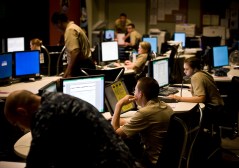
(DISA)
The days of hacking as a “gentlemanly sport” are over, according to the director of the Defense Information Systems Agency, who told a crowd of defense experts that cyber adversaries are dropping stealth tactics in favor of brute force.
“In cyber, it used to be almost like an intel[ligence] game — a gentlemanly sport, if you will,” said Army Lt. Gen. Alan R. Lynn. “People would try to break into your network, real easy, real slow, real quiet; then they’d sit still and watch. Then they’d move a little, maybe take some information, and leave.”
Lynn, who is also commander of the Joint Force Headquarters-Department of Defense Information Networks, made the comments at the AFCEA Defensive Cyber Operations Symposium on Wednesday. They were reported by the agency.
Nowadays, he said, hackers are behaving less like spies and more like special forces.
The enemy is “kicking in the doors. It’s loud and it’s fast. It’s snatch and grab. The gloves are off. They’re going after senior leaders at their offices and at home. It’s a different world,” Lynn said. “It is a fact that our networks and infrastructure are under constant attack by our adversaries.”
As commander of the JFHQ, Lynn has full command and control of all defensive cyber options across DOD. Before JFHQ’s launch in January of 2015, these resources were spread across various branches, hindering efforts at a quick and decisive response to cyber threats.
Despite this concentration of assets, Lynn said, the need for cooperation across industry and government remains critical.
“We have to all start working together,” said Lynn. “It’s not getting better out there. It’s going to take a change in the way we do business. We need to find common ground and figure out what the future is going to look like on our networks and to develop better defense into our networks.”






